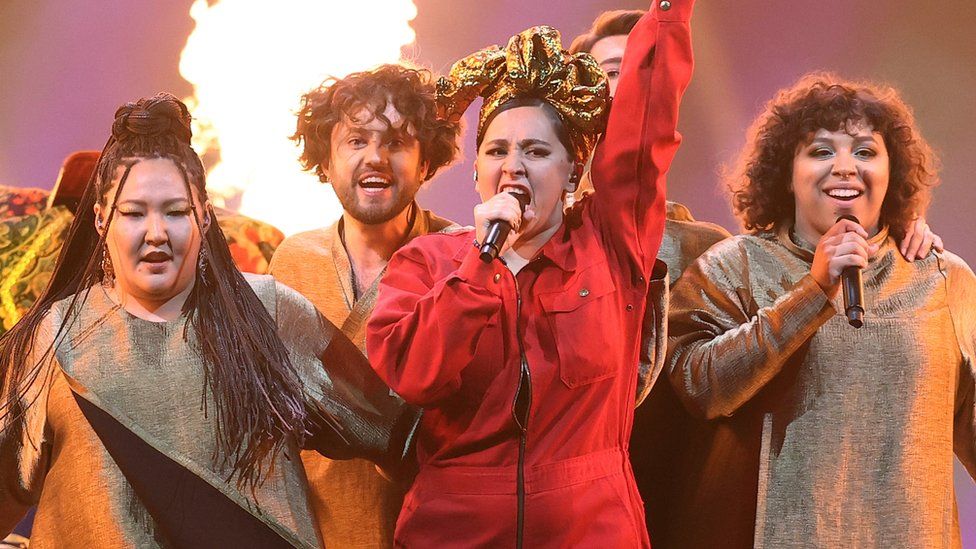Image source, Getty Images
Russia will be allowed to participate in this year’s Eurovision Song Contest, despite launching a military assault on neighbouring Ukraine.
Organisers called the competition a “non-political cultural event” and said they were “currently planning” to host entrants from both Russia and Ukraine at the event this May.
“We of course will continue to monitor the situation closely,” they added.
Ukraine’s state broadcaster UA:PBC had called for Russia to be suspended.
It said the Russian broadcasters, who oversee the county’s participation in the contest, had been “a mouthpiece for the Kremlin and a key tool of political propaganda” and had taken part in “systematic dissemination of disinformation” against Ukraine.
It said this is “contrary” to the values of the EBU.
Russia’s delegation has yet to respond to their comments.
Simmering tensions
Tensions between the two countries have overshadowed previous editions of the song contest.
Russia were favourites to win the competition in 2016, until Ukrainian singer Jamala stole a last-minute victory with a song that depicted the deportation of Crimean Tatars by Josef Stalin in 1944 – a horrific chapter that the nation’s parliament has described as tantamount to genocide.
The lyrics were widely interpreted as a criticism of Russia’s annexation of Crimea in 2014. Jamala, who is herself a Crimean Tartar, appeared to confirm the link when she told the press: “The main message is to remember and to know this story. When we know, we prevent.”
On the path to victory, her song picked up several important votes from former Soviet countries who traditionally vote for Russia. Eurovision expert John Kennedy O’Connor called the result “a pointed slap in Russia’s face”.

Image source, Getty Images
A year later, Russian contestant Julia Samoylova was blocked from entering Ukraine, which was hosting the competition, because she had reportedly toured Crimea without entering it through the border with the Ukrainian mainland.
The Ukrainian government considers people who enter the territory via Russia to have crossed the border illegally.
Russian television station Channel One then announced it would not broadcast the contest or take part.
All eyes on Italy
This year’s Eurovision is due to take place in Turin, after Italian rock band Maneskin won the 2021 contest.
Russia has yet to put forward a contestant, while Ukraine has selected hip-hop trio Kalush Orchestra, whose song Stefania was written as a tribute to their mothers.
The band replaced the country’s original contestant, Alina Pash, who withdrew last week after facing scrutiny over a trip she made to Russia-controlled Crimea in 2015.
There is no suggestion that Pash entered Crimea from Russia, but she said the controversy over her visit had overshadowed her participation in the contest.

Image source, Getty Images
Russian forces entered Ukraine on Wednesday night, with explosions in cities across the country, airstrikes on military targets and reports of troops crossing the border by land and sea.
The invasion has been met with condemnation from world leaders around the globe. Countries including the US and UK have announced that they will be imposing sanctions on Russia.
However, Eurovision organisers insisted the competition should be free from politics, as it “unites nations and celebrates diversity through music”.
Their response was criticised by Sweden’s state broadcaster SVT.
“The EBU needs to rethink this,” SVT’s CEO Hanna Stjärne said in a statement. “I sympathise with the basic idea of Eurovision as an apolitical event. But the situation in Europe is extremely serious with Russia’s invasion of Ukraine. It crosses all boundaries.
“We have called on the EBU to change course and will follow the development closely.”
Meanwhile, Jamala called on Eurovision fans not to ignore Russia’s actions in Ukraine.
“I don’t know how this is possible, but they bombed peaceful people,” she said in an Instagram video. “Please support Ukraine. Stop Russian aggression.”































